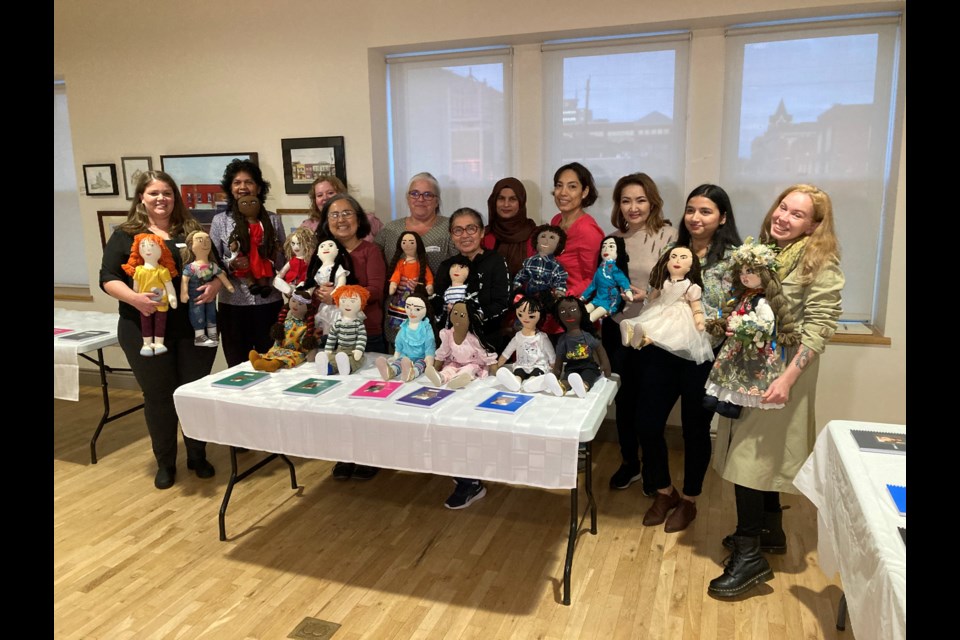The North Bay & District Multicultural Centre held a unique event Thursday evening, aimed at nipping discrimination and bias at a young age, through the Unlearning Bias Using Persona Doll Project.
“This project is meant to address some challenging yet invisible issues in our community, faced by our children who present visibly different in many ways,” said Vindra Sahadeo Program Coordinator/Equity and Inclusion Facilitator at the Multicultural Centre.
“Our experience has been that many of our young clients who are visibly different, face exclusion and in some cases outright verbal and physical attacks by their peers."
Lined up on tables around the room at the North Bay Museum were 17 persona dolls representing children in the community who have faced discrimination due to personal biases.
“This project is meant to teach community members how to make persona dolls, which are dolls that represent various identities, cultures, and experiences,” explained Julie Van Berkel, Welcoming Communities Coordinator with the Centre.
“These dolls will then be used by early childhood educators in classrooms and in daycares. They will be used to help teach and open up a dialogue with young children around discrimination bias and any sorts of bullying or problems that they have in schools.”
The dolls were created over the summer at various one-day workshops. The Multicultural Centre received funding for the project through the North Bay and Area Community Foundation.
Project coordinators reached out to marginalized community members to create the dolls.
“So clients of the Multicultural Centre who are immigrants, and then we also reached out and have some LGBTQ representation, Indigenous representation, and various cultures and community members and identities,” explained Van Berkel.
“The hope is that they will continue making dolls as the need grows within the community because we have connected with early childhood educators, school boards, and daycares, to sell the dolls to them and get them into classrooms.”
Van Berkel explained that each doll comes with its own journal.
“It gives some information about the doll, its story, who they are, where they’re from, and information about their culture. It also shares some stories.”
The doll makers used the dolls to share their personal stories of times either they or their children experienced discrimination, and how they felt as a result.
“To really give first-hand examples of biases within the community, so we can help address those,” said Van Berkel.”
“We have anecdotal evidence from our clients as well as our community partners that people have experienced discrimination, racism, and just a lack of understanding of different cultures.”
Doll maker Ankha Wiedman, originally from Mongolia, has lived in North Bay for the past four years.
It meant a lot for her to be able to participate in the project.
“I’m so happy to put my contribution to this, anti-bias, anti-racism, starting with early childhood kids. It makes me really happy. It will be a really good education I think,” said Wiedman.
“Eventually, I hope everybody will understand it is one world and it doesn’t matter what colour skin the person could have, we are all human beings. So I hope everybody will treat each other nicely, the colour really doesn’t matter. Treat others the way you would want to be treated.”
Mayra Ceja and her son Santiago are originally from Mexico.
The story behind her persona doll named Oscar, who arrives in Canada as a young boy, unable to speak English.
The doll’s story is similar to her own five-year-old son’s personal experience of moving to Canada from Mexico.
“Oscar is kind of afraid to be in a new country, so he is hoping to have new friends. Because he is shy, he is not really open to many kids. The changes in his new life are really big, so he is hoping to have a happy new life and meet new friends,” said Ceja.
Project coordinators hope to sell the dolls to daycares, and schools.
“These persona dolls are great between the ages of two and seven years old. So all the way from nursery daycare up until grades one and two,” said Van Berkel.
The project is a first of its kind for North Bay.
“We’re very excited to see how much support we receive from the community as well as the school boards to learn new skills and tools for addressing discrimination within the classroom,” said Van Berkel.
“Trying to address the discrimination within the community, we wanted to start young with our children. The program has run successfully in other countries in other communities and so we’ve now implemented it here.”
